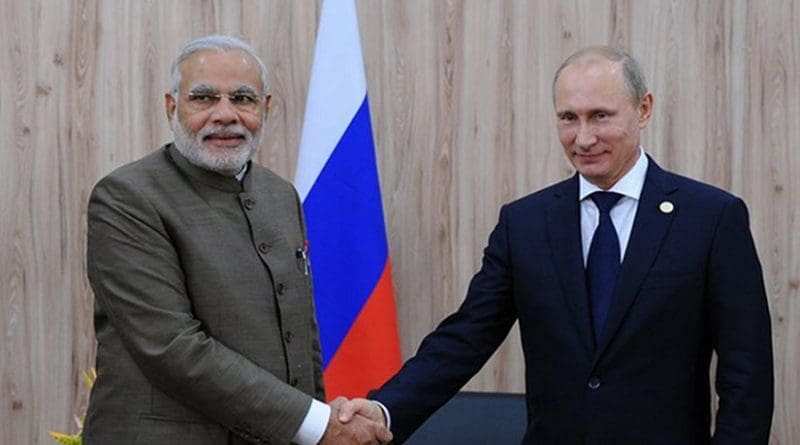Re-Election Of President Vladimir Putin And Its Impact On India – OpEd
On 18 March, Russia took to the ballot box for the seventh time to elect their president. This year it was significant because the day marked four years of Crimea’s accession to Russia. It was also important because the citizens of Crimea too voted for the first time1.
There were eight candidates who stood the election, excluding Alexei Navalny who is supposedly the strongest opposition candidate to the incumbent Russian President Vladimir Putin. The candidates are—Pavel Grudinin (Communist Party of the Russian Federation), Vladimir Putin (independent), Ksenia Sobchak (Civic Initiative), Vladimir Zhirinovsky (Liberal Democratic Party of Russia), Sergey Baburin (All-People’s Union), Maxim Suraykin (Communists of Russia), Boris Titov (Party of Growth) and Grigory Yavlinsky (Yabloko).
For the first time, the authorities changed the system of voting for people who cannot vote in places of their permanent residence – the earlier practice of using absentee ballots (special documents that citizens had to receive in advance) was changed to simply filing in a request either through a unified document processing center or even via the internet. Officials expected the new system to prevent the use of rigging schemes – known as ‘carousels’ – for which they have been previously criticized by the opposition.
The highest regional turnout was reported in the Siberian and Far East regions of Yamalo-Nenetsk, Chukotka and Tuva. One hundred percent of all 112 Russian citizens registered in North Korea and the only Russian currently in space, Anton Shkaplerov, on the International Space Station, also registered their preferences – the latter passing down his preference through a proxy on Earth. Russians staying in Ukraine were barred from voting except the diplomats in Kiev.
The independent election monitor Golos reported instances of ballot box stuffing, people being pressured to vote, and various other violations. Over 1,500 foreigners have been accredited to monitor Russian presidential election. Ella Pamfilova, head of the Russian Central Election Commission, said that there were no major violations during the vote, and that only “minor and local complaints” were received. The election commission said that there was cyber attack on the information center.
Despite the rumours of cyber attack and rigging of the elections, President Putin has regained his leadership till 2024. He won with an increase of 10 percent (76 percent) from the 2012 election which was at 64 per cent. President Putin’s nearest competitor, millionaire communist Pavel Grudinin, received about 12 percent. The other two candidates, Ksenia Sobchak and Vladimir Zhirinovsky got less than 2 percent and about 6 percent respectively. Yesterday by mid day nearly 51.9 pe cent of Russia’s 110 million voters took part, compared to 47.6 percent recorded at 2012.
President Putin’s victory was imminent due to the progress Russia has been able to make at the international system. He through his strong and hard policies, including secession of Crimea to Russia, military support to the Syrian President Bashar al-Assad, diplomatic actions along with China to avert a war between the US and North Korean etc. has been able to restore Russia’s glory which was tarnished due to the collapse of the Soviet Union. Despite the sanctions imposed by the West, he was able to make Russia a self sufficient economy with a growth rate touching 1.5 percent. It is expected that the economy will continue to grow at the same rate this year.
During his latest Federal Assembly address on 1 March, he laid down the vision for Russia that included development in the employment and wage sector, housing and health sectors, science and technology, smart cities, well being of the citizens including the senior citizens etc. He also highlighted a strong Russia through the upgradation in the Russian weaponary system including the nuclear weapons. He warned the world to not take Russia anymore as a weak country.
In this background, the bilateral relationship between India and Russia seems to be at an optimal swing. President Putin, during the same address, mentioned about Russia’s focus on strengthening its relationship with India and China. Under the leadership of President Putin, India and Russia entered the Strategic Partnership in 2000 that led to a special and privileged one in 2010. The high level visits and engagements at both bilateral and multilateral foras highlight the importance of the relationship.
With the re-election of President Putin, India can expect in the continuation of a strong bilateral relationship and active engagement in the regional and global levels. However, working on the convergences between both the countries such as—rooting out terrorism, development in the upgradation on the bilateral trade, working on joint projects both under the various projects including the Make in India, development of smart cities by Russia, development of nuclear civil plants in Bangladesh etc. would help in the furthering of the relationship. The operationalisation of the ISNTC and the negotiations undertaken at the EAEU holds promise for strengthening of the relationship through FTAs etc.
The free and transparent communication at all the levels supported by the Track 2 and 1.5 dialogues will help in the better understanding between the two countries.
*Dr. Indrani Talukdar a New Delhi based Russian analyst. Disclaimer: The views are that of the authors and not of the Council.
Notes:
1. It was reported that the Crimean Tatars complained about being forced into casting their votes in the Russian presidential election against their wish.

